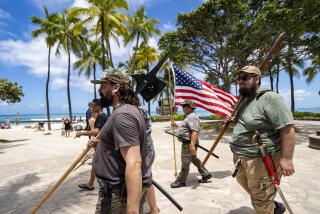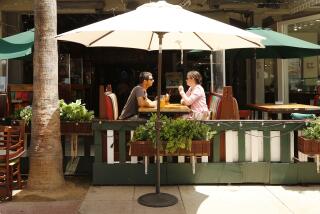Tougher Laws for Hawaii Tour Sales : Tourism: Outlets that sell island activities have been accused of misleading and sometimes high-pressure selling tactics. Regulation should aid travelers.
- Share via
Activity desks and booths, the outlets from which travelers buy many of the tours and activities sold in the Hawaiian Islands, have been placed under tighter scrutiny by state laws to help prevent consumers from being misled.
In all, there are anywhere from about 700 to 1,000 of the desks/booths set up mostly in hotel lobbies and street locations throughout the islands, selling such activities as day cruises, helicopter “flightseeing,” horseback rides, luaus, yacht charters, jet skiing, para-sailing, kayaking and sightseeing. Much like travel agents selling flights, cruises, hotel rooms and packages, the agents working at activity desks and booths receive commissions for their work.
Some activity desks/booths are independently owned and contract for space in hotels. Other desks may be owned by hotels or time-share companies. The latter has come under some fire for its sales tactics. More on that later.
The Activity Owners Assn., a three-year-old, Maui-based group representing more than 100 activity providers, estimates that Hawaii’s activities industry generates about $792 million annually. Of that total, the AOA estimates that at least 80% of the revenue comes from activity desks/booths.
There were minimal regulations covering the activity desks until two years ago, according to Jan Pinney, executive director of the AOA.
At that time, a law was passed--and amended last June--that covers the various practices of activity desks. Among other issues addressed was “stickering”--activity desks are now prevented from putting stickers with their own identification over the name and telephone number shown in brochures and flyers of the company that actually provides the activity.
“Stickering was a very widespread practice,” Pinney said. “Consumers sometimes thought they were dealing directly with the provider and not a middleman.”
Activity desks/booths can still use stickers, but now they have to indicate that they are an intermediary and cite a special state-issued registration number.
Moreover, the activity supplier’s name and telephone number must be identified somewhere in the brochure. Complaints had been lodged that some activity desks tried to pressure providers to eliminate this information in order for their products to be sold.
Tie-ins with time-share operations pose another potential source of confusion. Some desks work closely with or are owned by time-share companies. Travelers may see signs or ads in visitor newspapers offering discounts of 50% to 80% off various packages sold at activity desks. But often it may not be disclosed until after the point of sale that, in order to qualify for these special discounts, consumers must participate in a time-share briefing.
“There’s nothing wrong with time-share companies offering activities as gifts, as long as the traveler knows the score up front,” Pinney said. “We get a lot of complaints on this one.”
According to Pinney, potential customers have sometimes even been followed down the street by aggressive time-share salesmen from the activities booths.
“Anytime you see a large discount, 50% and over, it’s almost always related to a time-share operation,” she said. “The activity desk gets what is called a ‘show-up fee’ in addition to whatever commission is involved in selling the actual activity.”
While there is a separate law about time-share operations calling for disclosure, the regulation isn’t always enforced, Pinney said.
A new law mandates that activity desks must indicate in writing before any payment is made that travelers are required to attend a sales presentation in order to buy a particular activity.
Another misleading aspect of street-located activity desks may be their names. “Some activity booths with street locations use names such as ‘Free Tourist Information’ or ‘Visitor Center,’ which give travelers the impression that they are some kind of government-run place,” Pinney said. “In effect, travelers may think they’re getting unbiased information instead of biased opinions based on which providers or vendors the activity desk is working with to get the best commission, which averages about 30%. There’s nothing illegal about this, and sometimes it’s good marketing, but travelers are often misled.”
On the positive side, activity desks can make arrangements with providers to create their own bargain prices for consumers, much like consolidators in the airline industry who negotiate with airlines to offer the same flight at a lower price than the airline itself.
“But you have to be careful,” warned Pinney. “In some cases, activity desks have added a surcharge and actually increased the price of an activity.”
For example, Pinney cited a helicopter ride over the island of Maui that was recently advertised for $149 when sold by the provider, but was sold for $169 by an activity desk.
“In another case,” she said, “ads in one visitor publication explained in big type that para-sailing was available for $39.95. But the small print at the bottom said that this rate was only available from 8 to 8:30 a.m., with the regular price $45 to $50.”
There is no law against travel packagers adding a markup fee when selling activities. Consumers are advised to check with actual providers of any activity to find out their prices before committing to buy from a packager.
According to another new law that went into effect in Hawaii last October, those firms that sell tours and activities--which covers travel agencies as well as activity desks and some hotels and airlines--have to maintain a special trust account for consumer funds, and register with the state. Both laws prohibit firms selling travel from using consumer-paid money as cash flow to operate their businesses, while allowing them to only keep a maximum of 15% in commissions.
“Activity desks are now treated like travel agencies and have to put consumer money in a special trust account within three business days, which is another consumer safeguard,” Pinney added.
The AOA operates a special hot line for consumers in Hawaii: (808) 871-7947.
More to Read
Inside the business of entertainment
The Wide Shot brings you news, analysis and insights on everything from streaming wars to production — and what it all means for the future.
You may occasionally receive promotional content from the Los Angeles Times.









